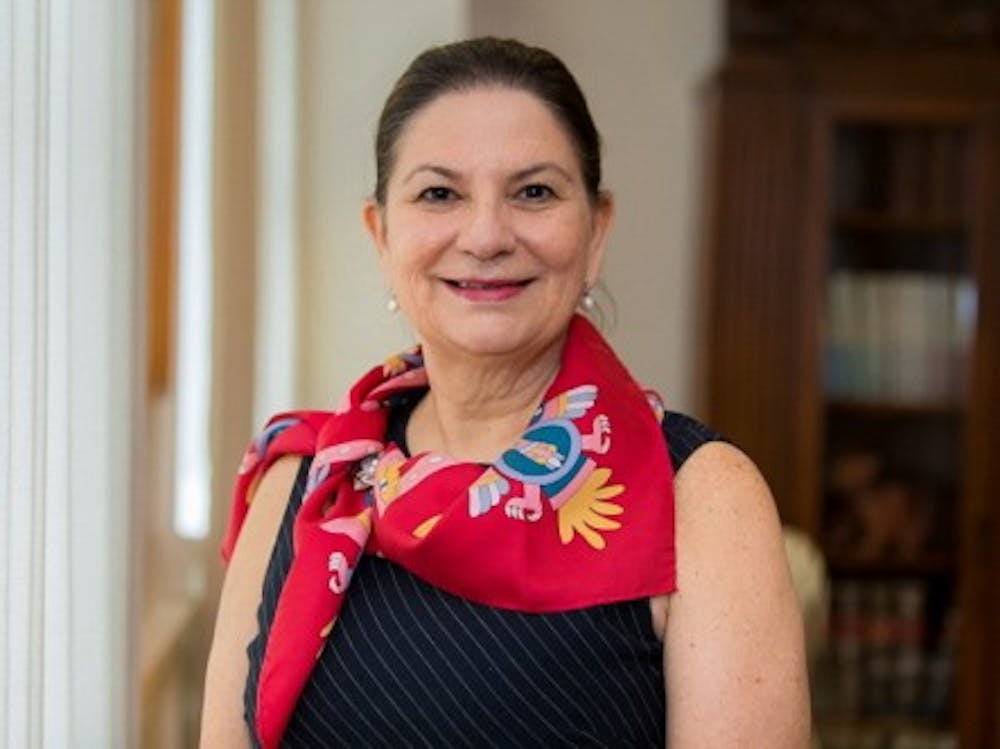Martha Bárcena Coqui, Mexican ambassador to the United States since December 2018 and the first woman to hold the position, spoke to Duke students Wednesday in a virtual event.
Topics focused on United States-Mexico relations, increasing tensions due to immigration, the replacement of the North American Free Trade Agreement by the United States-Mexico-Canada Agreement, and the impact of COVID-19 on an already-complex diplomatic relationship.
“Be proud of your culture and what you represent,” Bárcena urged students as she reflected on the parallel trends of increasing opportunities for Mexican Americans and increased hostility toward immigrants.
In the past 30 years, she argued, the United States and Mexico have gone from being almost distant neighbors to being essential trade partners, thanks to agreements such as NAFTA. Supply chains between the two—as well as Canada—have become completely integrated in areas ranging from pharmaceutical supplies to automotive parts. The free trade area encompassing Mexico and the United States is now valued at over $1.3 trillion, which, as Bárcena points out, is greater than the gross domestic products of some nations in the Group of 20.
Bárcena remarked that she is proud of the newfound educational and professional success found by many Americans of Mexican origin, but is saddened that many still do not appreciate the contributions they are making to American society.
The ambassador recalled being shocked in the wake of the 2019 El Paso shooting, citing the shooter’s manifesto and its claim that Mexican American workers should be relegated to unskilled labor and not allowed the high levels of education that many are now attaining.
Bárcena further discussed the status of the millions of undocumented immigrants residing in the United States, approximately half of whom are from Mexico. She cited the efforts of her country’s government to help its citizens apply for programs such as Deferred Action for Childhood Arrivals within the United States, despite the challenges such programs have faced in recent years.
Regarding the migrant caravans which made their way from several Central American countries to the U.S. border, Bárcena acknowledged that many of these immigrants may have violated U.S. law in attempting to cross the border, but still have human and labor rights, which she sees as her duty to protect.
Mexico has granted asylum to large numbers of Central American refugees, which Bárcena attributed to a difference in perspective between the two North American countries—Mexico views the immigration situation as an economic issue, with food-insecure, unemployed workers seeking job opportunities, while the United States views it as a border security issue, focusing on preventing unsanctioned immigration rather than alleviating migrants’ economic woes.
Bárcena recognized that the U.S. Congress has the right to determine its own immigration policy, but said she hopes that decisions will be made based on an appreciation for contributions already made by Mexican Americans and other residents of Latin American origin, rather than any xenophobic political ideology. She pointed out that large portions of the essential workers relied upon by many during the COVID-19 pandemic—from workers in meatpacking plants to medical professionals—are in fact Mexican Americans.
While the current crisis has the ability to reinforce existing social stratifications, Bárcena said that it also has the potential to open new perspectives, and hopes that there will be a greater appreciation going forward for the complex relationship between the two countries and the rich contributions made by citizens of both countries, on both sides of the border.
The event is part of the "Conversations with the Ambassador" series organized by the Center for International and Global Studies' Rethinking Diplomacy program.
It was co-sponsored by Duke’s Program in American Grand Strategy and Center for Latin American & Caribbean Studies, with the latter’s director Ambassador Patrick Duddy moderating the conversation.
Editor's note: This article was updated Sept. 16 to reflect that the event was organized by the Center for International and Global Studies.
Get The Chronicle straight to your inbox
Signup for our weekly newsletter. Cancel at any time.

Parker Harris is a Trinity senior and an editor at large of The Chronicle's 118th volume.

